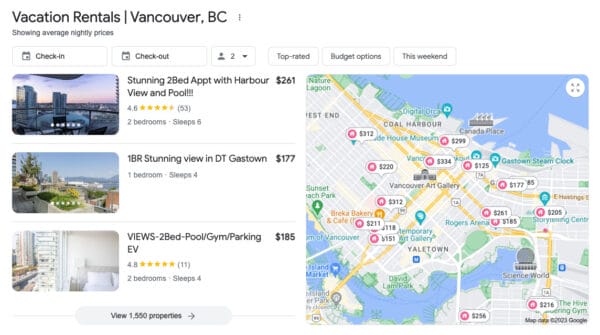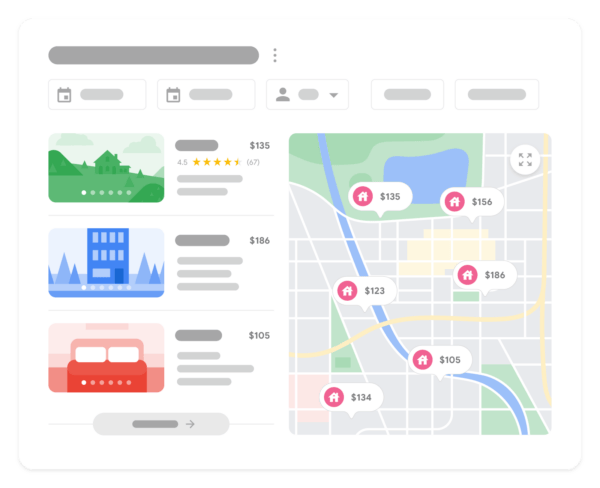Google has been actively unveiling a series of new rich results in recent weeks. Continuing this trend, they have introduced yet another addition – Vacation Rentals.
On December 4, 2023, Google released Vacation Rental structured data. If your website features vacation rentals, adding this new structured data markup to your site can enhance the visibility of your listings on the search engine results page (SERP).
History of Vacation Rentals in Search
Prior to this, Google’s SERP already featured an enhanced search function for vacation rentals. When you search for ‘vacation rentals in Vancouver’, for instance, you’ll find rental prices along with filtering options to adjust dates and occupancy.
The recent expansion in visual representation within search results marks a significant change. Previously, this feature wasn’t available through structured data, and even if you incorporated structured data on your site, appearing on the enhanced feature wasn’t guaranteed.
Now that Google supports vacation rental structured data, it provides greater control over the appearance of your vacation rental in search results. While Google historically utilized an existing XML feed method, which remains a viable choice for large partners and those managing multiple domains and brands, the use of structured data offers a simpler and more flexible approach.
What You Need To Know About Vacation Rental Structured Data
Vacation rental structured data is structured data you can add to your vacation rental listing pages to achieve a rich result on Google. The vacation rental rich results will provide users with information about the listing, such as the name, description, reviews, location, images, and more in the search results.
What are the Required and Recommended Properties?
To be eligible for the rich result, you must include all the required properties.
However, we recommend including as many of the recommended properties as possible. These details are not just about what appears on the rich result visually; detailed listings contribute to effective filtering for users’ specific needs.
By including properties like addressLocality and numberOfBeds, your listing becomes more relevant to targeted queries. For instance, someone searching for “vacation rentals in downtown toronto” can be shown listings that have specified the locality of downtown Toronto in their structured data.
Be sure to refer to Google’s Structured Data Documentation as a guideline for recommended and required properties for Vacation Rental structured data.
Certain required and recommended properties will also call for users to nest other Types of markup in the property. For example, one of the required properties to be eligible for this rich result is ‘containsPlace’, and Google expects you to nest the Accommodation Type under that property. This means that you need to create markup for the Accommodation Type, before linking it to the containsPlace property.
Nesting your markup and connecting entities using your Schema Markup can be challenging especially if you are new to implementing structured data. If you’re looking to implement proper vacation rental structured data on your site, our Schema App team can help.
Eligibility Criteria
It’s important to note that eligibility criteria apply, and this rich result is exclusively reserved for vacation rentals, not hotels.
Additionally, you can only list vacation rentals on Google if you are:
- A registered property management business with a direct booking website
- Already listed on a booking site that’s integrated with vacation rentals on Google
Shared rooms, partial houses, and peer-to-peer rentals aren’t currently eligible for integration.
So what does Google consider a “vacation rental property”? In order to be eligible, your property must:
- Provide a furnished space that is private to the guest/renter
- Accept short-term, overnight reservations
- Be managed and cleaned between stays
Expanding on these criteria, there are three different groups that can deliver vacation rental listings:
- Connectivity partner: Ex. Hostaway – a tool that manages vacation rentals across multiple channels
- Property managers: Ex. You run your own B&B
- Online travel agencies and metasearch providers: Ex. Aggregator sites like Expedia
This feature is limited to websites that meet certain criteria, and additional steps are required in order to integrate. Once you’ve completed the Vacation Rental Partner integration, you simply need to mark up your site with the appropriate structured data, allowing Google to crawl it to generate the listing feed. To delve into the specifics and ensure compliance, review Google’s Starter Guide Overview.
What Does a Vacation Rental Rich Result Look Like?
Visually, this rich result has not changed dramatically from the pre-existing search enhancements that closely resembled this new rich result. What has changed is how you can achieve this enhanced result through structured data.
The Impact of Achieving a Vacation Rental Rich Result
Achieving this rich result comes with many implications, some more beneficial than others.
On the positive side, it contributes to a zero-click search experience, aligning with Google’s user-centric focus. However, the flip side is the potential for intensified price comparison, which can be both advantageous and detrimental. While it facilitates user comparison and enhances visibility, it may pose a challenge by demanding more competitive pricing.
In addition to this, the rise of zero-click searches will impact aggregator sites, as users find answers directly on the SERP, potentially rendering aggregator sites obsolete.
In a highly competitive space like vacation rentals, this rich result becomes a game-changer. Without it, smaller businesses might struggle to rank on the SERP, particularly when contending with larger sites boasting higher domain authority and substantial investments in SEO and advertising.
Given the existing trend of price comparison across various platforms, this rich result simply expedites the inevitable research and decision-making process for users.
To stay competitive in the search landscape, it is imperative to implement this markup, ensuring your vacation rental business remains visible and relevant to user needs.
Implement Vacation Rental Structured Data On Your Site
With the many changes happening in search and with rich results coming and going at an unprecedented rate, maintaining an agile structured data solution is crucial.
The Schema App Highlighter ensures the dynamic and continuous updating of your structured data to align with any content or pricing changes made to your site. This agility is key to staying competitive, as outdated Schema Markup can jeopardize your eligibility for the targeted rich result.
For efficiency and adaptability, we recommend leveraging the Schema App Highlighter to seamlessly synchronize your markup with evolving website content and structured data requirements. Interested in learning more about the Schema App solution? Click here to get started.



